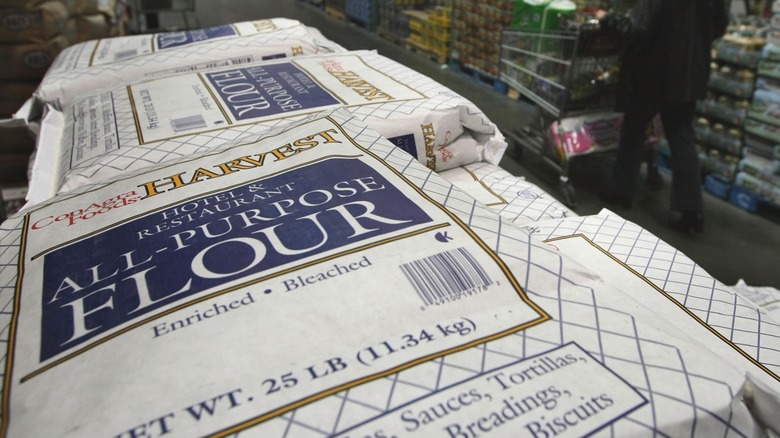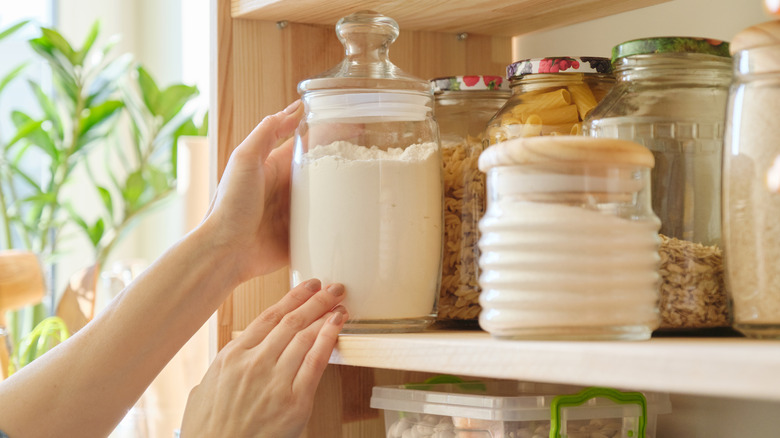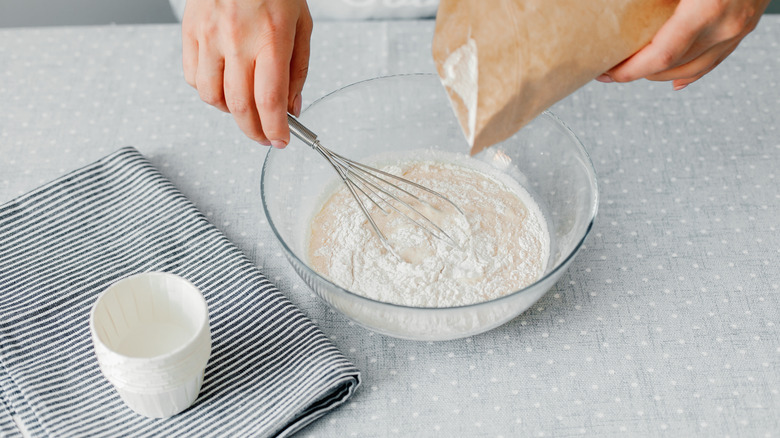What You Should Know Before Buying Flour At Costco
Over the years, Costco has become a can't-miss destination for shoppers in search of kitchen deals and affordable food court finds. Members love the cheap rotisserie chickens and the inflation-proof Costco hot dog — two of the company's quintessential staples. While the big-box store might be your go-to spot for stocking up on snacks, taste-testing free samples, and, of course, buying groceries in bulk, a stop at Costco isn't always the right route when shopping for certain pantry essentials, such as flour.
It might be smart to add a few months worth of toilet paper, cleaning supplies, batteries, and canned goods to your Costco cart, but think twice before picking up any grocery items you'll just end up throwing away later. Unless you run a bakery, you should probably consider forgoing the 25-pound bag of flour, as it will likely go bad before you get the chance to make all the recipes of breads and cakes you have saved. After all, spoiled flour leads to poor-tasting pastries and lackluster loaves.
Flour doesn't stay fresh forever
Even if you think of yourself as a sourdough-making sensation or a pastry prodigy, if you don't have plans to regularly bake bread for the whole neighborhood, it's best not to buy flour in bulk. After it's been milled, standard all-purpose flour lasts for at least a year when stored correctly (sealed in an airtight container that's left somewhere cool, dry, and dark). You can further stretch its shelf life by storing it in the refrigerator or freezer, but once flour expires, you may not want to use it to bake bread.
Flour that's gone bad might take on a noticeable, rancid odor, which likely means the fats in it have oxidized. It can also grow mold after absorbing nearby moisture. You can identify moldy flour by changes in texture, such as the formation of large, visible clumps. Of course, like other perishable ingredients that are left sitting around, flour can also fall victim to insect invaders. As soon as you spot signs of critters, toss the powdery stuff immediately to ensure that no bugs end up in your baked goods.
What happens if you use old flour
If you've already traversed Costco's aisles upon aisles of grocery options and bought the most basic of baking staples to stock up your pantry, you're not necessarily out of luck if your big bag of all-purpose flour expires before you finish it. If it's not noticeably spoiled, you may be able to keep using it past its best-by date, but flour is a bit finicky. Older flour might not perform as well as fresh flour and can have varying effects on your bakes. That's why it's best to bring home just a small bag or two that you know you'll use before it goes bad.
Less-than-fresh flour can acquire an unusual stale flavor, which will come through in your breads. The proteins in flour can also go bad over time when exposed to air. This can hinder gluten formation and lead to overly crumbly pastries or heavy, dense dough that lacks stretchiness. The result is somewhat similar to what you might have experienced if you're ever mistakenly over-kneaded bread dough. Batter made from spoiled flour can create concave cakes and breads that won't rise.


